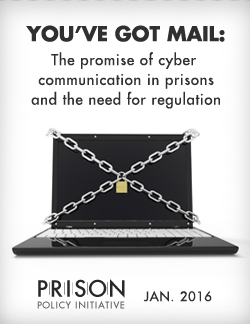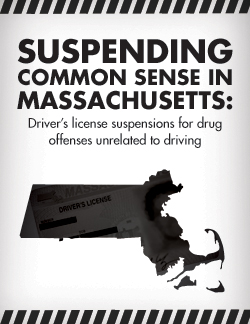Our newest staffer comes to us from the Fair Housing Council of Oregon and The Massachusetts Fair Housing Center.
by Peter Wagner,
January 28, 2016
 Please welcome our new Policy & Communications Associate, Alison Walsh.
Please welcome our new Policy & Communications Associate, Alison Walsh.
Alison is a 2009 graduate of Vassar College with a degree in American Culture, where her weekly classes with people incarcerated at the Otisville Prison and Dutchess County Jail through the Green Haven Prison Program introduced her to the need for prison reform.
Welcome Alison!
New report finds electronic messaging in prisons and jails is a product of questionable value at inflated prices
January 21, 2016
FOR IMMEDIATE RELEASE: January 21, 2016
Contact:
Bernadette Rabuy
brabuy [at] prisonpolicy.org
 Easthampton, MA — Given the extreme distances that separate incarcerated people from their families, technological innovations that allow more frequent and faster communication between incarcerated people and their families would be a welcome improvement. A new report by the Prison Policy Initiative finds that while many facilities are still stuck in the last century, the growing number of facilities experimenting with electronic messaging are all too often providing incarcerated people and their families a product of questionable value at inflated prices.
Easthampton, MA — Given the extreme distances that separate incarcerated people from their families, technological innovations that allow more frequent and faster communication between incarcerated people and their families would be a welcome improvement. A new report by the Prison Policy Initiative finds that while many facilities are still stuck in the last century, the growing number of facilities experimenting with electronic messaging are all too often providing incarcerated people and their families a product of questionable value at inflated prices.
The report, You’ve Got Mail: The promise of cyber communication in prisons and the need for regulation, analyzes the current state of electronic messaging in correctional facilities. The report finds that electronic messaging — which is often referred to as “email for prisoners” — actually has very little in common with the email services available to free-world users. For example:
- Some electronic messaging systems are “inbound only.” With these systems, free-world users are able to electronically send a message to an incarcerated person, but the incarcerated person must respond with a handwritten letter.
- While email is free for those of us in the free-world, private companies charge incarcerated people and their families anywhere from 5¢ to $1.25 per message to communicate electronically.
“Calling the electronic messaging offered to incarcerated people and their families ‘email’ would be an insult to email,” explains Stephen Raher, author of You’ve Got Mail. “Once again, it seems that the prison phone giants are providing more of the same old exploitation rather than providing true innovation.”
The report builds on the Prison Policy Initiative’s work uncovering the previously hidden prison and jail phone industry and exposing the harmful trend of video visits replacing traditional in-person jail visits. The report was submitted to the Federal Communications Commission in response to its request for comments on advanced communication services in prisons and jails and provides the FCC with nine recommendations. The report also offers seven other recommendations for legislators, state public utility commissions, and correctional administrators, all with an eye toward transforming electronic messaging from a poorly designed and expensive technology to a fair and reasonable tool for communication.
You’ve Got Mail: The promise of cyber communication in prisons and the need for regulation is a collaboration between Prison Policy Initiative and pro bono legal analyst Stephen Raher of the organization’s Young Professionals Network. Stephen’s previous work with the Prison Policy Initiative provided a first-of-its-kind analysis of high-fee release cards.
The report is available at: http://www.prisonpolicy.org/messaging/report.html
-30-
In response to the FCC's request for comments, we submitted four analyses of unresolved issues
by Aleks Kajstura,
January 21, 2016
In response to the FCC’s call for further comments on their regulations of the prison and jail phone industry, we submitted our analysis of and recommendations on four unresolved issues:
- Single Calls: we explain how the FCC’s attempt to rein in “single call” programs left a significant loophole that can be easily closed.
- Western Union and MoneyGram: we highlight an unintentional loophole in the FCC’s regulation of fee-sharing schemes between the phone companies and money transfer providers, and suggest that the FCC could instead copy Alabama’s solution to the problem.
- Bundling unrelated services: we outline how bundling phone services with unrelated financial and other technology services is creating a growing opportunity for companies to create an end run around the FCC’s current regulations in the short term as well as undermine the FCC’s long-term goals of fostering a self-regulating ICS market through competition.
- Video visitation: we updated the FCC on issues surrounding video visitation, showing that a national consensus has developed acknowledging that the growing trend of video visitation replacing traditional in-person visitation is a major step in the wrong direction and providing 5 recommendations for regulation.
Reply comments are due February 1, and can be submitted online for docket number 12-375.
Massachusetts House unanimously votes to end unnecessary license suspensions for drug offenses
by Bernadette Rabuy,
January 15, 2016
Last week, the Massachusetts House unanimously approved H. 3039, which would repeal the state’s practice of automatically suspending driver’s licenses for drug offenses unrelated to driving.
 Last year, our report, Suspending Common Sense in Massachusetts: Driver’s license suspensions for drug offenses unrelated to driving, found that the state automatically suspends the driver’s licenses of thousands of residents each year for drug convictions unrelated to driving. These suspensions make roads more dangerous, waste taxpayer and law enforcement resources, and prevent people with previous involvement in the criminal justice system from fulfilling responsibilities that require driving.
Last year, our report, Suspending Common Sense in Massachusetts: Driver’s license suspensions for drug offenses unrelated to driving, found that the state automatically suspends the driver’s licenses of thousands of residents each year for drug convictions unrelated to driving. These suspensions make roads more dangerous, waste taxpayer and law enforcement resources, and prevent people with previous involvement in the criminal justice system from fulfilling responsibilities that require driving.
The Senate unanimously approved a stronger version of the bill last year. Next, legislators will likely negotiate a compromise, and then it will land on Governor Baker’s desk. The bill has broad support from Attorney General Maura Healey, the Massachusetts District Attorneys Association, sheriffs, and editorial boards all over the state. Stay tuned for next steps and for a Prison Policy Initiative report on the other states that have yet to reverse this ineffective relic from the War on Drugs.
 Please welcome our new Policy & Communications Associate, Alison Walsh.
Please welcome our new Policy & Communications Associate, Alison Walsh.




